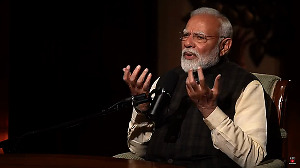The traditional "India Meeting", held over lunch on Friday as part of the World Economic Forum annual meeting, brought to light three significant new policy initiatives that the Union government is expected to unveil shortly to tackle the growing infrastructure problems, relax labour market rigidities and to further open up the economy, although with safeguards.
The first of these initiatives is that a new institutional mechanism will be created soon in which the Union government will invest up to 25 per cent of its total capital with the rest to be funded by banks and financial institutions.
India & the World Economic Forum
The primary responsibility of the new mechanism will be to facilitate increased investment in the infrastructure sector. About $150 billion of investment in infrastructure is needed in the next 10 years, according to the government's internal estimates.
Secondly, the Union government may encourage the states to frame their own labour laws in keeping with the specific flexibilities each of them might like to introduce depending on the nature of industries they would like to attract.
In this way, states desirous of labour market reforms can move ahead and can create competitive pressure for other states to introduce similar reforms.
Some states have already come to the Centre asking it to leave them alone to frame their own liberal labour laws.
Thirdly, the Union government has made up its mind to agree to further tariff reductions and dismantling of physical trade barriers in various sectors, provided domestic industries in their infancy are not adversely affected.
The Indian stand is that while the tariff and physical controls will not be used to protect inefficient units in the domestic market, infant industries need to be given some protection for a specific period of time. This offer will be made by India in its forthcoming negotiations at the World Trade Organisation.
The India Meeting was attended by Commerce Minister Kamal Nath, Rajasthan Chief Minister Vasundhara Raje and about 35 industry leaders from India and different countries.
The discussion was moderated by Sunil Kant Munjal, president of the Confederation of Indian Industry. ABB's North America CEO, Dinesh C Paliwal, also spoke at the meeting and highlighted the urgent need to create a more vibrant infrastructure sector to make India a thriving manufacturing hub.
Kamal Nath's explanation that the infrastructure problems were to be solved by the proposed creation of a new infrastructure financing facility did not satisfy many participants, including Vijay Mallya of the United Breweries group.
They wondered if infrastructure development could take place with the government playing only the role of a facilitator. It was necessary that the government played a dominant role in setting up infrastructure projects like those in the power and road sectors, they said.
Even the labour market reforms initiative of encouraging states to go their own way to change the laws as they wished came in for some attack.
Vasundhara Raje argued that it was better to have a unified flexible labour law at the central level, instead of leaving it to the states. The Centre must bite the bullet on this issue, she said. Successive governments at the Centre have made promises of labour market reforms, but have failed to introduce them so far.
The differences between Kamal Nath and Vasundhara Raje also came out in the open during the luncheon meeting.
While Nath wanted to take credit for being the government that was the original reformer, having started reforms in 1991, Raje argued that he should not forget the advantages of inheriting the reforms that were continued by governments that preceded his.
Bureaucracy was another issue that came up during the meeting. Both the leaders said the bureaucracy was reforming itself, but changing attitudes was the biggest challenge. But the silver lining was that bureaucracy was recognising the need for changing its style, Raje said.
In his opening remarks, Nath said India was in the process of shaping its future, aided by robust exports and industrial growth rates, the demographic advantage of a large skilled population and natural advantages in areas such as the information technology and the pharmaceutical sectors.
Raje said her government in Rajasthan was seeking the involvement of business and civil society in rebuilding the state and solving many of its problems.






 © 2025
© 2025